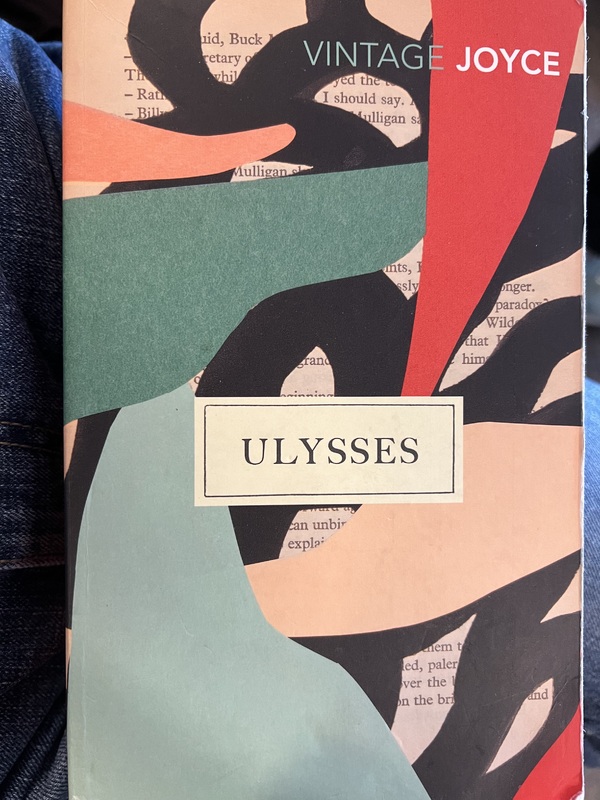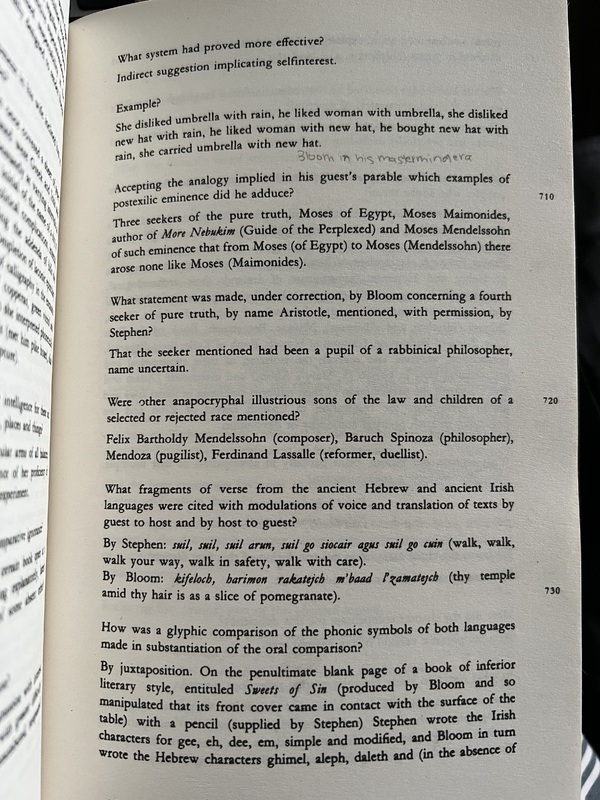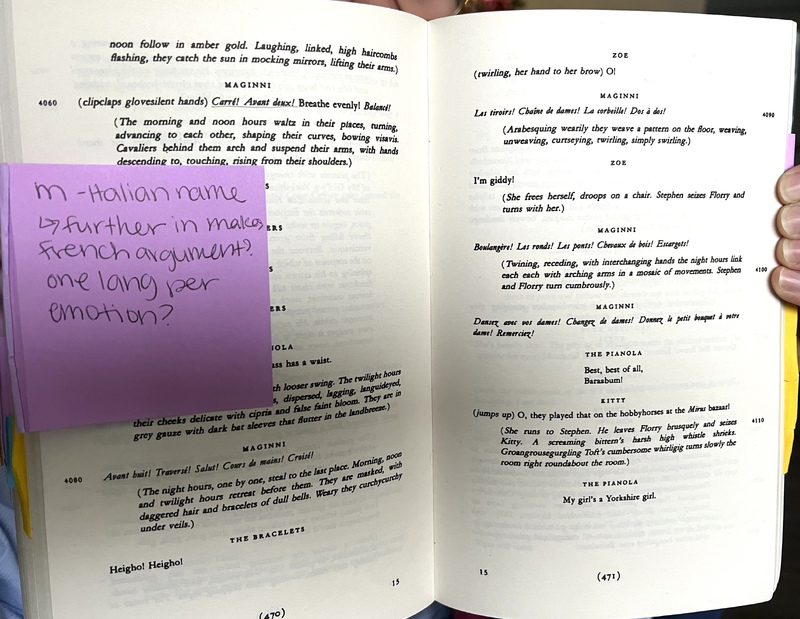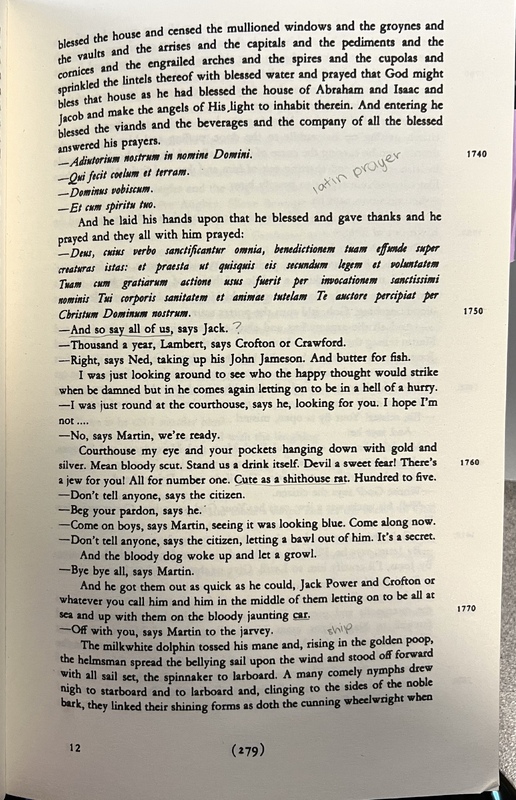Waklee Keegan (Translations)
Rationale
The object I have chosen to cover this semester is the Penguin Vintage Classics 2022 edition of James Joyce’s Ulysses that is being studied in class. The reason I chose this text is because I was intrigued from page one with Joyce’s first disruptive Latin sentence. Throughout the novel Joyce uses approximately seven different languages, including English. The immediate use of one other than his native tongue, instead of Gaelic as could be expected of a Dubliner, piqued my interest and did not wane. As the characters continued throwing out lines and not explaining their use or providing translation, I came to the conclusion that I needed to uncover more about this utilization of language. Rather than looking at a translated edition to view the perception of Ulysses outside of Joyce’s English context, I am aiming to focus on the use of different languages specific to the newest edition that affect how the novel itself is perceived from a contemporary perspective, in the year of our lord James Joyce, 2022.
As to the reason behind the occasional, and seemingly random, vignettes of prose in Latin, French, Italian, and more, Joyce never quite explains. By using the newest standard edition of the novel, and a healthy dose of internet and in person research, I shall attempt to accurately and adequately translate the phrases. My aim is to discover how they work to create and expel members of a community, by including the audience in on the perceptive meaning of a phrase Joyce found too important to translate. The use of this edition shall also attempt to discover if the alternate phrases are intentional to the story itself, or rather a Joyce-ian attempt at reaching broader audiences from Dublin in the 20th century.
My hypothesis is that, while often confusing to the overarching storyline surrounding the text, the opposing phrases, so to speak, may provide further insight into Bloom, Mulligan, or Dedalus’ thoughts. I hope to uncover an underlying theme between the use of language and the story as a whole, because as Joyce has proved time and again so far, he often provides obscene depth into circumstances not always worthy. By including thoughts in a different language, it could be used to diversify the idea presented, or divert the reader from the flimsy particle of plotline,. In theory, translating these phrases may allow me to uncover a hidden meaning Joyce has interwoven. With the knowledge that Joyce was fluent in as many as 5 languages himself, it is possible his multilinguality is a personal joke however, one to possibly include any audience in on. In reading the rest of the novel I shall keep an eye for how the translanguaging of the characters disrupts the story, adds to it, or works to purposefully alienate the audience.
Literature Review
The multilinguality of Ulysses presents a radical idea about the translingual nature of a Dublin not as diverse as Joyce attempts to present. Switching from one language to another forces the audience’s attention away from any train of thought and storyline, to the phrase, and perhaps whatever the intended, or actual, meaning is. Even in the early 1920’s English was the dominant language in Ireland, so the presence of such diverse language questions Joyce’s intent by such effort. The multilinguality he crosses into with this novel provides a complex framework of language and identity, one that is not identified by all who read it. The subgrouping of audiences sorted by those who understand each different language and those who don’t, is performed in such a way that seems to divert the intention of the novel. Latin speakers alone are immediately simultaneously clued in, and singled out, by the first page of the novel, and yet it is most probably going to cause them to continue reading to see if they are further included.
One of the first sources I looked to was Penelope Gardner-Chloros and Daniel Weston's “Code-Switching and Multilingualism in Literature." The notion of codeswitching presented by Gardner-Chloros seemed a very accurate and present approach given the context she is writing, however the application of this particular aspect to Ulysses does not provide any information or shed light on the reason for such switching. Chloros seems focussed on the application of codeswitching to the cross cultural boundaries of space in reference to specific regions of Europe, but the type Joyce uses seems much less focussed on meaning. She approaches the fluidity of language and code switching as an aspect of natural experience of multinational individuals such as English- Greek Cypriots; something innate to those who have experienced a lifetime of different languages. However from the perspective Joyce presents, this codeswitching seems a subconscious, or liminal, commentary on thought and meaning rather than an approach of multilingual Dublin.
I also looked at Penelope Gardner-Chloros' solo work on codeswitching titled, "Code-Switching". Sociolinguistic approaches to Ulysses view the linguistic code switching present as an aspect of Joyce’s commentary on modern Dublin society, however I do not believe this to be the full truth. As Penelope Gardner-Chloros details in her book, there are complexities to language specific to the native speaker, which code switching can glaze over. Regarding the inherent spontaneity where code switching tends to occur, Gardner-Chloros notes an informality that seems contrary to what Joyce is attempting by crafting such dynamic groups.
The first text I looked at outside of the novel was Paige Miller's “Translanguaging Joyce: Monolingual Disruptions and Translingual Enrichment in Ulysses.” The 'monolingual disruptions’ of French, Spanish, and numerous others identified by Miller did not seem to provide evidence for the cohesive framework of translanguaging she attempts to present. Rather, these disruptions seemed to identify a lack of cohesiveness to the story, intentional or not. The self explanatorily disruptive nature of these phrases provided further complexity to the commentary of humanity Joyce seems to be attempting, yet the lack of translation continues to remain as much a mystery as ever. I agree with Miller and others' previous postulations that translanguaging is integral to the background of the characters, but the argument I am attempting to uncover is whether the use of the text in translation positively affects the perceived community formed by the work. The application of multilinguality to the conversation of Ulysses is a highly relevant one, and the research notes that code switching could draw in multilingual readers. This seems relevant, as there are many different languages present within the story that, although also seem Joycean and intentional to distraction, can give a small boon to those with a more diverse linguistic background.
One of the last sources I looked to for critical commentary on the application and transmission of different languages was Scotton's compilation of studies titled "Bilingualism, Multilingualism, Code-Switching.” This article listed a compilation of sociolinguistic studies governing the application of language transmission and code selection. The information presented here shows the presence of choice as an aspect of code transmission and language selection intentional to the person and their experience. Connecting to Ulysses, this did not seem applicable to the code switching present there. The aspect of selection noted by Scotton is absent in Joyce’s work, so these studies show how the characters are not present in the selection of language, and the multilinguality is applicable to the storyline overall rather than to each character.
Linguistic Diversity and Community Construction
The object I chose for this project is the Vintage Joyce 2022 edition of Ulysses. This object is the most clear choice in order to uncover the revolutionary adeptness with which James Joyce treats language, and also the flippant nonsensicality he supplies. James Joyce does not seem an author intent on including the audience in on his jokes, ideas, and perspectives of characters, yet the most disruptive part of his extraordinarily eclectic writing style remains the out of place translanguaging present in every chapter of Ulysses. Clear to the laymen reader are turns of phrase often used as bipartisan colloquialisms, such as, en route, finale, and the like. However, there are much more complex translingual disruptions in the novel, and I shall focus on how these sections of text work to create a sense of community; almost crafting complete psychological in-groups and out-groups.
The fact there is even a conversation to be had around the topic of language within the context of Ulysses invents its own community; those who have read the novel to understand such questions, and those who have not. However Joyce does not seem to have one clear meaning to supply by using different languages. In some cases, it enriches the description or experience- also providing a peak to a culturally diverse background for some of the characters- and in others it is a waste of an internet search to translate the verse. For example, adding “au fait” to the end of a sentence, while to the strictly English speaker seems a flowery exclamation, but the community with knowledge of the French language can see it is nonsense in context of the conversation (Joyce 522). This sentence and many others would be better comprehended if the disruptive phrase was removed. Yet by inclusion of these phrases, however incomprehensible they may seem to the monolingual audience, there is a subtle community structuring occurring.
On the other side of the same conversation, the application of multilingual audiences' comprehension of the different phrases used within the novel provides further linguistic subgroups. In “Eumaeus” it is thrilling to feel like you are in on a secret the rest of the audience doesn’t know, but only if you understand the Russian “Gospodi pomilyou” (line 463). Following the devotional phrase Joyce writes, “that’s how the Russian prays” (511). Regardless of the context provided, Russian speakers get to see something they recognize within the slog of literary euphemism and political polemic. The actual meaning of the Hebrew and ‘ancient Irish’ within lines 727-729 of “Ithaca” does not matter either, as utility of their translation is evidence of the book reaching past the lens of its own self importance to clue the audience in on a small part of the diversion of language dynamics at play (Joyce 563).
These two very different utilizations of language work in two very different ways as well. “Eumaeus’” Russian is only contextualising the phrase within the bounds of the tale the supposed sailor is weaving; and the unidentified narrators of “Ithaca” are translating the Hebrew and Gaelic used by Bloom and Dedalus respectively at different points within the novel. Questionably accurate is the basis for truth in the confessional interview style of the Ithaca chapter, and the musings of D. B. Murphy in “Eumaeus”, yet there is something to be said by the final chapter with any sort of structure providing context at least for some of the past confusion in the novel.
When I began this project, I believed there to be some overarching conclusion to be drawn from Joyce’s complex use of codeswitching and multilinguality. After completing the book, I can confidently say that the use of language is much more complex than the single frame of thought I first believed. Not only does the translanguaging work to include a variety of linguistic audiences, but expel those who do not have any multilingual experience. More than that, the novel is its own piece of work that the community outcasting performs, because even if you are a single language speaker isolated by the use of Jouce's prominent multilinguality, by completing the novel, you become indoctrinated into the community of Ulysses itself.
Bibliography
Gardner-Chloros, Penelope, and Daniel Weston. “Code-Switching and Multilingualism in Literature.” Language and Literature: International Journal of Stylistics, vol. 24, no. 3, 2015, pp. 182–193., https://doi.org/10.1177/0963947015585065.
Gardner-Chloros, Penelope. Code-Switching. Cambridge University Press, 2009.
Joyce, James, et al. Ulysses. Vintage Classics, 2022.
Miller, E. Paige. “Translanguaging Joyce: Monolingual Disruptions and Translingual Enrichment in Ulysses.” Textual Practice, vol. 36, no. 2, 2021, pp. 262–282., https://doi.org/10.1080/0950236x.2022.2003095. Accessed 2022.
Scotton, C. M. “Bilingualism, Multilingualism, Code-Switching.” Language: Social Psychological Perspectives, 1980, pp. 327–328., https://doi.org/10.1016/b978-0-08-024696-3.50056-9.
Taylor-Batty, Juliette. “Protean Mutations: James Joyce's Ulysses.” Multilingualism in Modernist Fiction, Palgrave Macmillan, Basingstoke, UK, 2013, pp. 113–145.
Walsh, Keri. “The Horrors and Pleasures of Translating Ulysses.” Literary Hub, 16 June 2016, https://lithub.com/the-horrors-and-pleasures-of-translating-ulysses/.




